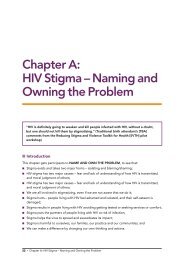Implementing Multiple Gender Strategies to Improve HIV and ... - ICRW
Implementing Multiple Gender Strategies to Improve HIV and ... - ICRW
Implementing Multiple Gender Strategies to Improve HIV and ... - ICRW
You also want an ePaper? Increase the reach of your titles
YUMPU automatically turns print PDFs into web optimized ePapers that Google loves.
Young men also build knowledge around <strong>HIV</strong> prevention, the effects of<br />
AIDS, puberty, sexually transmitted infections (STIs) <strong>and</strong> domestic violence<br />
through participa<strong>to</strong>ry workshops, monthly group discussions, <strong>and</strong> the<br />
process of researching <strong>and</strong> developing materials for their peers. They<br />
receive training <strong>and</strong> peer education sessions <strong>to</strong> build skills, including<br />
negotiation <strong>and</strong> communication skills, proper condom use, activity planning,<br />
reporting, lobbying <strong>and</strong> advocacy, <strong>and</strong> creating <strong>and</strong> realizing a joint vision.<br />
The young men develop dramas, songs, poems <strong>and</strong> traditional dances as<br />
outlets for creative expression. Finally, during soccer matches the players<br />
engage the crowd or the opposing team in discussions around rape, <strong>HIV</strong><br />
prevention, drug abuse <strong>and</strong> violence against women.<br />
Target Audience • Youth ages 15–24 who play soccer in community clubs<br />
• Female partners of soccer players<br />
• Community networks involved in the project<br />
Level of Intervention • District<br />
• Municipal<br />
Geographic<br />
Location<br />
Seven communities in KwaZulu Natal: Zondi S<strong>to</strong>re, Hopewell, Mafakathini,<br />
M<strong>and</strong>eni, Escourt, Grey<strong>to</strong>wn <strong>and</strong> Mpolweni<br />
Timeframe<br />
1998–ongoing<br />
Funders<br />
Joint Oxfam <strong>HIV</strong>/AIDS Program (JOHAP) – Oxfam Australia<br />
Partner<br />
Organizations<br />
Implementation partner:<br />
South African Football Association (SAFA)<br />
IMPLEMENTATION AND RESULTS<br />
Start-up <strong>and</strong><br />
Implementation<br />
Process<br />
The first phase of the project was <strong>to</strong> establish a relationship with the<br />
executive committee of SAFA. Early engagement with SAFA helped<br />
provide access <strong>to</strong> community soccer teams <strong>and</strong> ensured the support of<br />
these key stakeholders.<br />
The soccer players are responsible for program implementation. The<br />
players hold monthly meetings, which serve as men<strong>to</strong>ring sessions as well<br />
as opportunities <strong>to</strong> moni<strong>to</strong>r the implementation of each team’s program<br />
plans. The participants also discuss challenges <strong>and</strong> successes, gender<br />
issues, <strong>HIV</strong> prevention issues, <strong>and</strong> more. Group activities focus on<br />
education, condom distribution <strong>and</strong> events.<br />
Local Involvement/<br />
Ownership<br />
Young men’s ownership of the project has been established. Young men<br />
decide what activities <strong>to</strong> conduct in the community, what <strong>to</strong>pics they will<br />
address <strong>and</strong> how they will implement these. This may help sustain changes<br />
in attitudes over time. Also, TAI holds annual feedback sessions during<br />
which teams provide input in<strong>to</strong> proposal writing.<br />
134
















